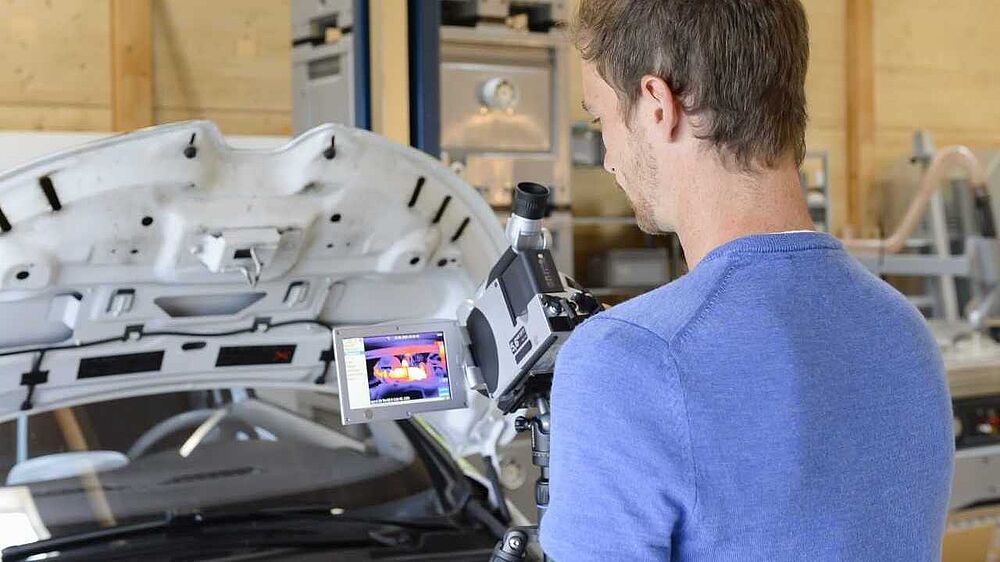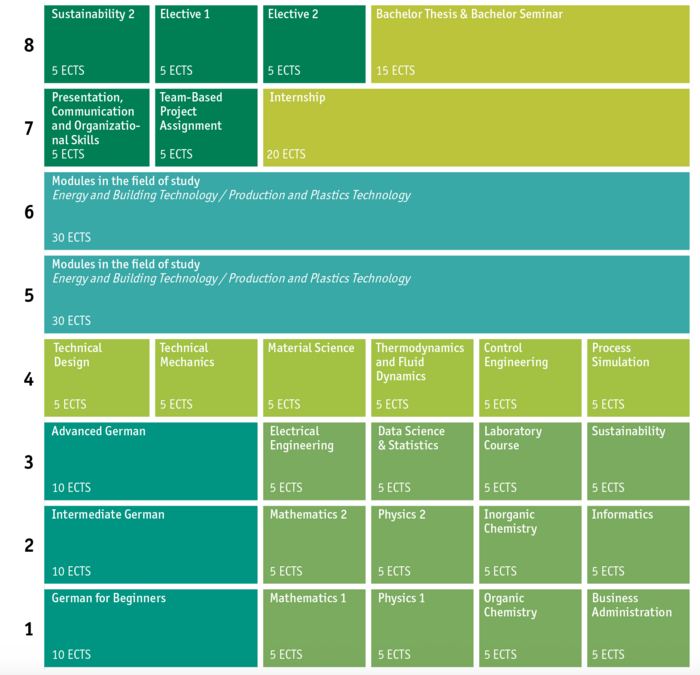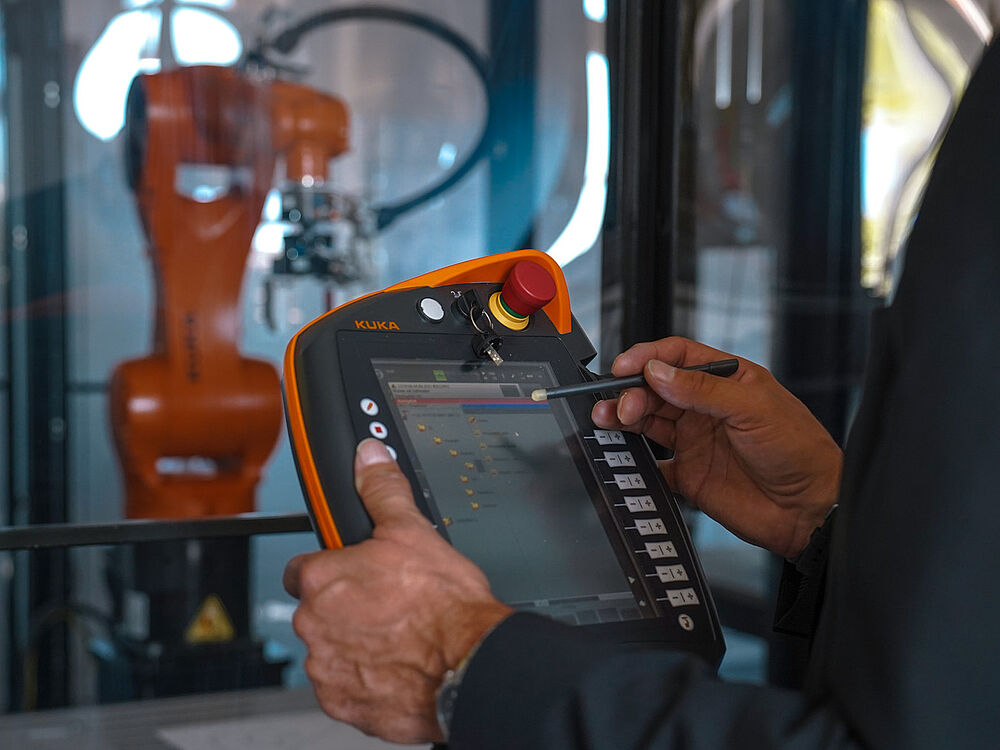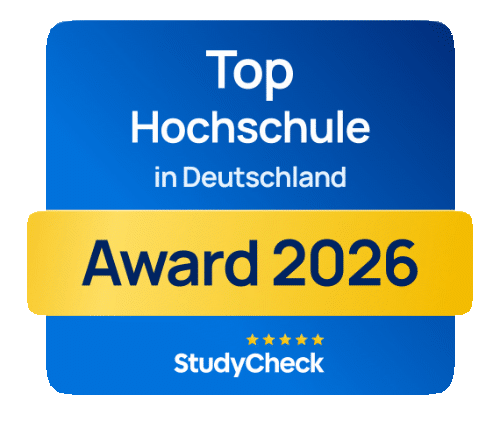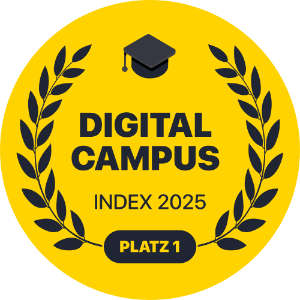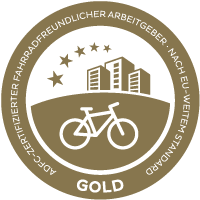As a versatile sustainability engineer, would you like to take on the challenge of reconciling our high-tech society with the requirements of an intact environment, help shape technological change in practice and get involved in research and development?
Then the “Applied Sustainable Engineering” degree program will give you exactly the right foundation! We offer you the opportunity to become a sustainability engineer in one of two fields of study in 8 semesters. You decide which field of study you would like to pursue:
In the Energy and Building Technology field of study, you will deal with the sustainable generation, consumption, and distribution of energy. In the field of building technology, you will learn about two key components of sustainable building technology: building construction and the technical equipment of buildings.
In the Production and Plastics Technology course, you will learn about the most important aspects of industrial production. A particular focus here is on use in the plastics industry. The material-specific issues relating to sustainable polymers and their production play an important role.
You only make the final decision on your field of study at the end of the fourth semester. This means that the first two years give you enough time to get your bearings and “get a taste” of the courses on offer.
| Short form | ASE |
| Type of study | Full time |
| Duration | 8 semesters |
| Award | Bachelor of Engineering (B.Eng.) |
| Start of studies | Summer semester |
| Admission restrictions | English B2 |
| Tuition Fee | for non-EU nationals: 1000 € per term |
| Lecture location | 1. semester hybrid, afterwards Ansbach |
| Language of instruction | 1.-3. semester English, afterwards German |
| Questions about studying | Prof. Dr. Wolf Christian Wilisch |
There are no specific admission requirements; however, an interest in the sciences in general or life sciences would be helpful. Some experience with the German language is helpful, but is not a requirement for admission.
There are, however, requirements for English language proficiency. As measured by the Common European Framework of Reference for Languages, you need level B2, as proven by
– an IELTS (International English Language Testing System) score of 6.0 or better
or
– a TOEFL (Test of English as a Foreign Language) score of 84 points or better
Additionally you must have the university entrance qualification or the eligibility for university admission for German universities. We use the Uni-Assist program (https://www.uni-assist.de/en/) to determine whether you qualify for admission.
Please refer to that website for further information.
Are you interested? Do you have all the necessary documents? Then apply here for the Applied Sustainable Engineering program!
The first semester takes place in a mixed format, so that students can initially study in their home country and have time for the necessary formalities (visa application, etc.). From the second semester onwards, all lectures are face-to-face courses at Ansbach University of Applied Sciences.
During the first three semesters, the lectures are held in English, however you will receive intensive German language training. This will enable you to attend lectures in German starting in the fourth semester. It is also good preparation for a high quality part time student job or internship at a regional company - and by the way might also be your ticket into the German job market after your studies.
In the first four semesters, you will learn important engineering fundamentals and gain an overview of the various aspects of sustainability.
At the beginning of the fifth semester, you decide on your chosen focus and specialize in it from then on.
Within your specialization, we offer you the opportunity to individually select the topics that you consider relevant to you.
In the seventh semester, the practical semester, you will gain initial experience as a future sustainable engineer in professional fields e.g. in a company.
In the eigth semester you will write your Bachelor’s Thesis. In addition, you have the opportunity to deepen your interests or learn about new topics in the elective modules.
Modules in the field of study
Energy and Building Technology
| HVAC |
Building Physics |
| Sustainable Building Construction |
| Seminar for the German Qualification ”Energieberater“ |
| Building Automation and Control |
| Energy Economics |
| Energy Law |
| Flow Simulation |
| Piston and Turbo Machinery |
| Industrial Communication Technologies |
| Electrical Machines and Drives |
| Electric Power Transmission and Distribution |
| Decentralized Energy Systems |
| Renewable Energy Systems Engineering |
| Project Management in Product Development |
| Power Electronics |
| Energy Engineering Laboratory Course |
Modules in the field of study
Production and Plastics Technology
| Production Engineering |
| Manufacturing Execution Systems |
| Production Simulation |
| Sustainable Joining Techniques |
Plastics Processing |
| Industrial Communication Technologies |
| Electrical Machines and Drives |
| Project Management in Product Development |
| Power Electronics |
| Integrated Management Systems |
| Automation Engineering |
| Lean Production |
| Tolerance Management |
| Plastics Processing |
The study course of Applied Sustainable Engineering optimally prepares you for your professional life with a German Engineering degree. Depending on the orientation of your studies, you can work as a Sustainable Engineer in a variety of companies and research institutions e.g.
- Plant and Mechanical Engineering
- Automation and Electrical Industry
- Consulting
- Energy Supply Companies
- Engineering Offices
- Chemical and Industrial Production Plants
- Public Utilities
- Technical services in public authorities, in companies in the biotechnology and environmental technology sectors and in information and communication technology
© 2026 Hochschule Ansbach
